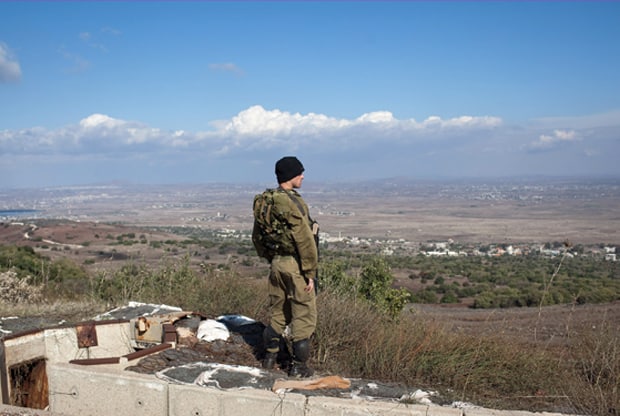Yom Hazikaron, Yom Haatzmaut are back to back, and Yom Hashoah is only a few days earlier.
The weeks following Pesach are always an emotionally charged period in Israel. From celebrating the redemption of the Jewish nation during Pesach, we move on to Yom Hashoah, the annual Holocaust Remembrance Day. We then move on to Yom Hazikaron when Israelis pay tribute to the country’s fallen soldiers in a solemn day of mourning. On this official Memorial Day, Israel also mourns the loss of civilians who were killed as a result of terrorism.
For many of us in Israel, this time period encompasses the price that we pay for being Jews, then and now.
We in Israel are defending and dying on the front lines on behalf of every Jew in the world.
To date, 23,169 soldiers have died since the establishment of the State of Israel. On this day, we commemorate each and every one of them. We witness how a whole country ceases its work, freezes and remembers those who have given their life to defend Israel.
Yet, that very evening, as the sun begins to set once again, the country undergoes a transformation. The streets are suddenly filled with people celebrating Yom Haatzmaut, Israel’s Independence Day. The celebrations continue into the next day.
Making this switch so suddenly has always seem to me as odd. Have we forgotten that but moments before, our hearts were heavy with grief for the family and friends that we lost, and continue to lose every year?
Yom Hazikaron and Yom Haatzmaut are purposely back-to-back for a purpose. The celebrations of Independence Day (Yom Haatzmaut) are incomplete by themselves. We celebrate these two events with the acute awareness that without the incredible sacrifice of those we have lost, there would be no State of Israel. Yom Hazikaron gives our Yom Haatzmaut meaning and perspective. We are forced to confront and remember the terrible price we have had to pay for our existence as a Jewish state, and because of this price, we value that freedom all the more intensely.
Yom Haatzmaut gives Yom Hashoah a greater meaning than ever before. We in Israel are defending and dying on the front lines on behalf of every Jew in the world. For the Jews of the diaspora, Israel has become a very real safe haven for every Jew to escape to and call home, only because he is a Jew. This is the very opposite of the not-so-distant past when entrance to a safe haven was denied only because one was a Jew.
Unfortunately, historical events as earth-shattering and history-ending as they seem at the time can eventually fade from the forefront of public consciousness and become memory.
When Holocaust survivors will no longer be around, and when there is no more opportunity to let children and educators hear firsthand testimony of the Holocaust, will the Holocaust be just another event studied in world history classes? With all of the effort that has gone into recording testimonies of the Holocaust be enough to preserve historical memory in terms of the magnitude and uniqueness of the Holocaust? At the recent ceremony at the Yad Vashem Memorial, Prime Minister Benjamin Netanyahu spoke passionately about the failure of today’s democracies to learn the lessons of the Holocaust. In doing so, he directly compared appeasement of the Nazis with contemporary efforts to engage Iran and its nuclear threat via diplomacy.
However, it is likely that much of what passes for liberal and enlightened opinion in both Europe and the United States will dismiss these analogies between the Shoah and the modern day existential threat that Iran poses for the future security of the State of Israel. Prime Minister Netanyahu is absolutely right when he points out that talk about the horrors of the Holocaust and vowing “never again” is meaningless when it is bound by policies that essentially empower those who not only deny the reality of the Shoah but also seek the means to perpetrate a new one.
Iran is not Germany, but on a day when the lessons of history should be uppermost in our minds, the burden of proof lies with those defending appeasement of a government that seeks to complete the work Hitler started, not with those lamenting this disgraceful attempt to make a devil’s bargain with a violent hate-filled theocratic regime. We are unable to escape the modern day interconnectedness between Yom Hashoah, Yom Hazikaron, and Yom Haatzmaut.
In Israel, Jews are a sovereign power and enjoy the dignity of Jewish self-government: they are keepers of their own land, speakers of their own language, shapers of their own national destiny. The old-world problems of the Jews—living in segregated conditions, burdened by humiliating legal restrictions, often impoverished and dispirited—are no longer Jewish problems in the modern State of Israel.
The message of the Passover Haggada, the event that began this period of Yom Hazikaron and Yom Haatzmaut is that there are no shortcuts to freedom. To gain and keep it, you have to be willing to fight for it. You must be will to make the ultimate sacrifice.
As Eric Cohen has recently written: “In this light, the sheer existence of modern Israel is an incredible fact and to some nothing short of a miracle. That from a few fragile settlements, and out of the ashes of the Holocaust, it has in only a few decades become the center of the Jewish people is one of the greatest political achievements in human history. This new Jewish civilization has created a permanent fighting force to defend itself. It survives through military strength, but hardly through that alone. Its real strength resides in the spirit of its people, one of the most optimistic, enterprising, and resilient citizenries on earth

